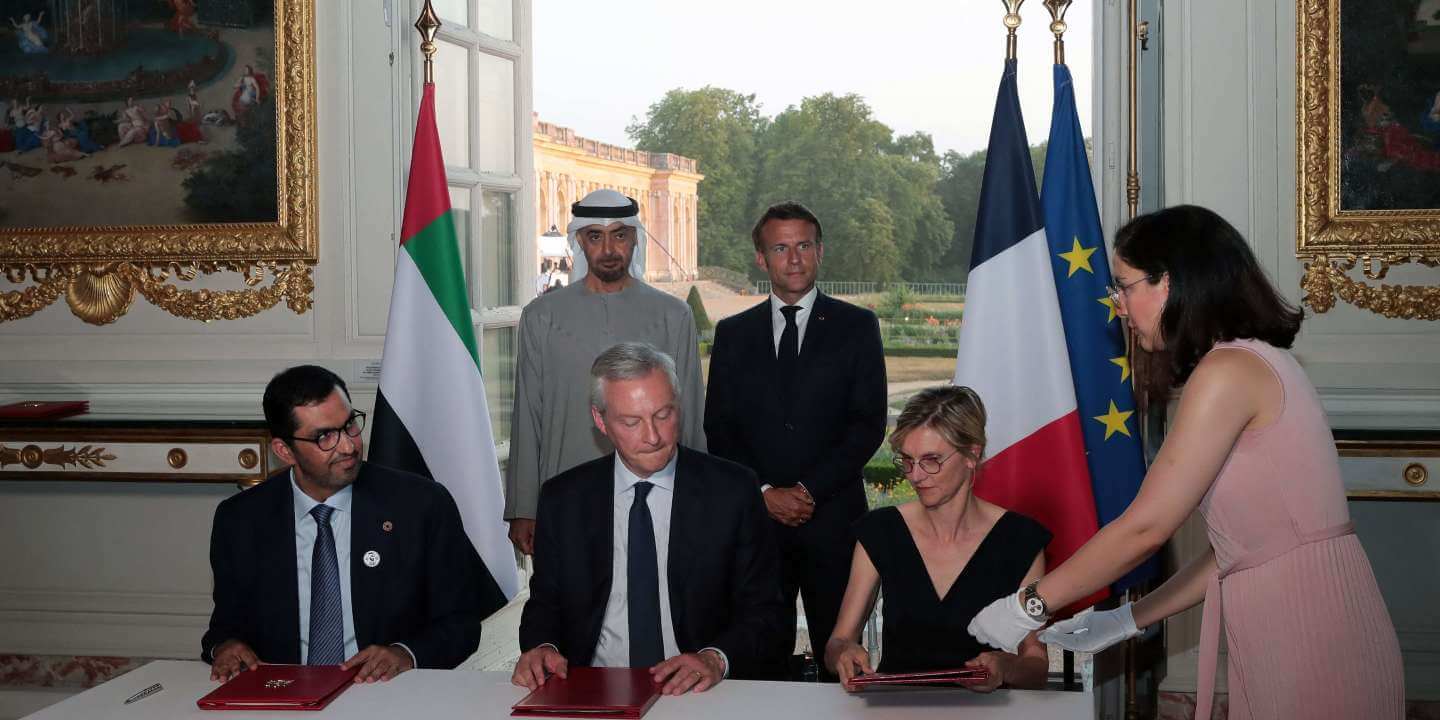In a continued effort by the European Union (EU) to look for alternative energy suppliers to Russia, France established a Comprehensive Strategic Energy Partnership with the United Arab Emirates while Italy signed an energy deal with Algeria that makes the North African country its largest gas supplier.
Following a meeting between Emirati President Sheikh Mohamed bin Zayed Al Nahyan and his French counterpart Emmanuel Macron in Paris, the two countries released a joint statement outlining a goal of “energy security and affordability.”
In light of the “ongoing pressure on global supply chains” and the “uncertain energy context,” French energy company TotalEnergies and the Abu Dhabi National Oil Company signed an agreement to increase fuel supply to France.
In the run-up to the meet, MBZ’s diplomatic advisor, Anwar Gargash, spoke of the UAE’s intention to reorient gas supplies to Europe “in this time of crisis.” However, the Emirati leader rebuffed pressure to increase production to bring down global prices, noting that the UAE is already at its “maximum.” He noted, however, that Saudi Arabia has some “spare capacity.”
I witnessed alongside President Macron an MoU signing to establish a strategic energy partnership between the UAE & France – advancing our collaboration in this priority sector. Through such sustainable economic ties, we continue to strengthen the bonds between our two nations. pic.twitter.com/ykmJNH545T
— محمد بن زايد (@MohamedBinZayed) July 19, 2022
During the meeting, Macron also applauded the UAE’s nuclear energy programme, which they agreed was a critical step towards decarbonisation. In this regard, the pair agreed to expand and continue their cooperation on nuclear energy, including by “sharing technical expertise, the provision of technology and nuclear fuel, as well as in the area of [research and development].”
As a part of their energy deal, the UAE and France will also expand their investment partnership that was established back in December 2021. In this regard, they agreed to identify and facilitate areas of cooperation on issues of common interests and capabilities.
They celebrated the launch of the UAE-France Business Council, which the pair said would increase “bilateral business opportunities” and “serve as a tangible outlet to expand the already constructive cooperation” between the business communities. The council will have special groups to make recommendations on energy, industry, technology, and investment.
🇦🇪🇫🇷
— حسن سجواني 🇦🇪 Hassan Sajwani (@HSajwanization) July 17, 2022
UAE - France … a strong and a historic relationship since the days of our founding father Sheikh Zayed bin Sultan. pic.twitter.com/gadXjQUIaO
Apart from the discussions on energy cooperation, Al Nahyan and Macron reiterated their commitment to cooperate to counter the food security crisis, achieve their climate goals, and advance peace and stability. They also agreed to expand cooperation in health, education, culture, and space.
Meanwhile, Italian Prime Minister (PM) Mario Draghi hosted Algerian President Abdelmadjid Tebboune in Rome to finalise a $4 billion agreement between American petroleum company Occidental, Italian oil and gas company Eni, and French oil company Total for “significant volumes of natural gas.”
In May, Eni also signed an agreement with another Algerian company, Sonatrach, to facilitate gas exploration. Moreover, in April, Draghi visited Algeria to sign an agreement to increase the delivery of gas from the Transmed pipeline by nine billion cubic metres per year from 2023-2024.
Il Governo ha subito dato il massimo contro la crisi energetica. Questo lavoro sta pagando: dopo poche settimane dall'inizio della crisi, oggi l'#Algeria è il nostro primo fornitore, grazie anche ai 4 mld di metri cubi di gas in arrivo. Avanti con partnership sempre più forti.
— Luigi Di Maio (@luigidimaio) July 18, 2022
According to a source quoted by Agence France-Presse, the agreement will allow the two countries to cooperate in developing a site along the Berkine perimeter that is expected to “generate more than a billion barrels.” The source added that Algeria will also increase its gas supply to Italy by four billion cubic metres.
Speaking to the media, Draghi said that Algeria will replace Russia “to become in recent months the biggest supplier of gas,” with Russia currently accounting for around 45% of Italy’s gas imports. Italy hopes to fill 90% of its gas storage system by November to meet the EU’s target.
Algeria has three pipelines to European territory—one that passes through Tunisia to Sicily, a second that passes through Morocco to Spain, and a third that also reaches Spain. In total, Algeria provides 11% of Europe’s natural gas needs.
The Italian PM added that the landmark deal will facilitate comprehensive energy cooperation in “green hydrogen, as well as solar, wind, and geothermal energy.”
The $4 billion agreement came just a day after Draghi and Tebboune signed 15 agreements and memorandums of understanding on sustainable development, energy, and micro-enterprises. Draghi celebrated the agreements as “fundamental for the [EU] as well as Italy” and a “testament to our determination to achieve even more in this domain.”
Both Italy and France’s deals come as EU nations prepare for a complete cut-off from Russian natural gas after the bloc recently agreed on a sixth package of sanctions that bans 75% of Russian oil imports and sets a 90% target for the end of the year. Moreover, Russia has already cut supplies to Poland, Bulgaria, Finland, Denmark, and the Netherlands to retaliate against sanctions, prompting concern that more countries could be set to follow.
Against this backdrop, European Commission President Ursula von der Leyen visited Azerbaijan on Monday and secured an energy deal to double natural gas imports from the South Caucasus country by 2027.

